With a Snowfinch present in southern Portugal over the first week of February along with a whole host of Iberian specialities that me and Alex hadn’t managed to catch up with in one of our visits to Spain, we decided to book a last minute break to Portugal in the hopes of catching up with some of our previously missed Mediterranean targets.
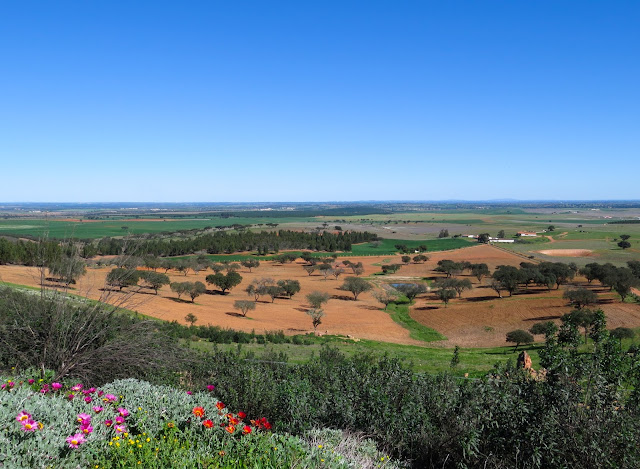
A new country for both of us, we touched down at Faro airport late on the Saturday evening ready to hire our car the next morning for a full days’ worth of exploring. Awaking bright and early in our hotel on the Sunday, our first bird of note was a singing Fan-tailed Warbler displaying enthusiastically over the reeds and tall grasses that surrounded our balcony, quickly followed by several House Sparrows chirruping away. Despite a careful search however, no Spanish Sparrows were interspersed amongst them – a key target for me during the trip. Several Barn Swallows and House Martins darted low down below the balcony, skimming the tops of the reeds and being a nice reminder of the spring and summer months still to come back in Britain.
After picking up our hire car we were on the road by 10, travelling along the south coast of Portugal to our first stop at Aljezur to see if the Snowfinch was still present. The 6th record for Portugal and a species that we had missed whilst in the Pyrenees two years ago, this was a bird that we could potentially jam in on out of habitat without having to make a special trip up to the high mountains.
 |
| The high Pyrenees of Northern Spain where Snowfinches would be more at home! |
Hearing that Iberian Magpies (one of our key targets of the trip) were supposedly ridiculously common in this area of Portugal prior to leaving the UK, we were expecting to be inundated with them as we made our way along the roads. Surprisingly this wasn’t the case, and we didn’t encounter any until at least nearly an hour in to our journey as we neared Aljezur. Stopping off at the side of the road to let an impatient driver past, we took the opportunity to scan the surrounding trees for signs of any birds. A female Blackcap darted quickly through the leaves and out of sight, before a large grey bird flying right caught my eye, quickly followed by another, then another, then another! Getting better views, the ID was confirmed - incredibly we had stumbled upon a large travelling party of Iberian Magpies and our first lifer of the trip! Counting up to 40 individuals present from the road, we hurried out of the car and ventured down the adjoining dirt track, in pursuit of what was now a fast flying and very loud flock on the move.
 |
| Record shot of our first Iberian Magpies |
With some of the flock perched on the nearby branches, we rattled off a few record shots – and then they were off, chattering noisily as they ventured deep in to the impenetrable thicket of trees on the other side of the path. Purely by chance, we had notched up our first new bird and one of our main targets of the trip.
Continuing on to the Snowfinch site at the Ribeira de Aljezur, we disappointingly arrived in the middle of a torrential downpour – it appeared that the British weather had followed us to Portugal and the conditions had sadly taken a turn for the worse. Undeterred, we made the best of the situation, and although the rain eventually abated, the ferocious winds made birding extremely difficult, with most species apparently taking shelter.
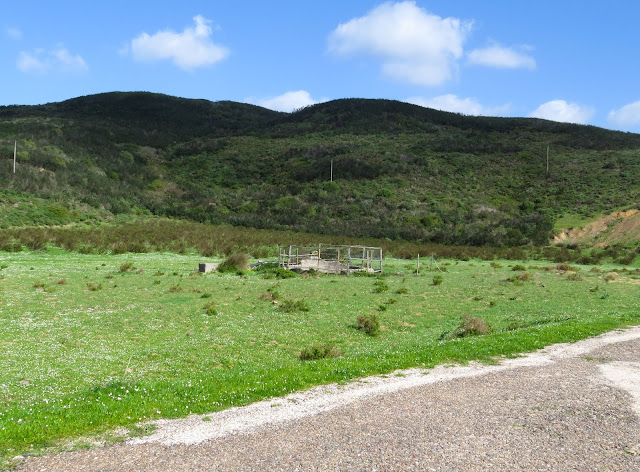 |
| The daisy fields the Snowfinch had been favouring - if anyone zooms in and spots a Snowfinch I'll be cross! |
 |
| White Storks braved the elements |
Never the less, we battled on, and were rewarded with several Crested Larks feeding in the company of Meadow Pipits and a solitary Water Pipit in the short grass. The black and white flash of wings heading in to the scrub was our first of many Hoopoes of the trip, while several Linnets and Goldfinches chattered overhead.
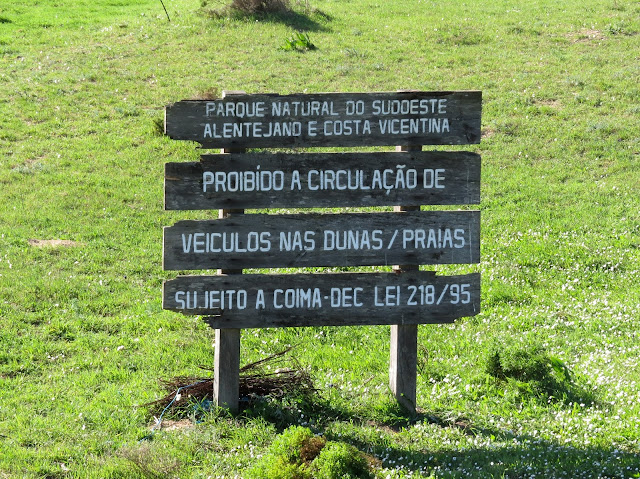 |
| The roadside sign the Snowfinch had taken a liking to using as a perch |
Patrolling the daisy fields from the shelter of the car, we encountered two very obliging Iberian Grey Shrikes - a subspecies of Southern Grey Shrike that is found in Spain and Portugal. We watched on as they hunted from the exposed perches despite the return of the rain, offering great photo opportunities and a good chance to see this abundant species up close.
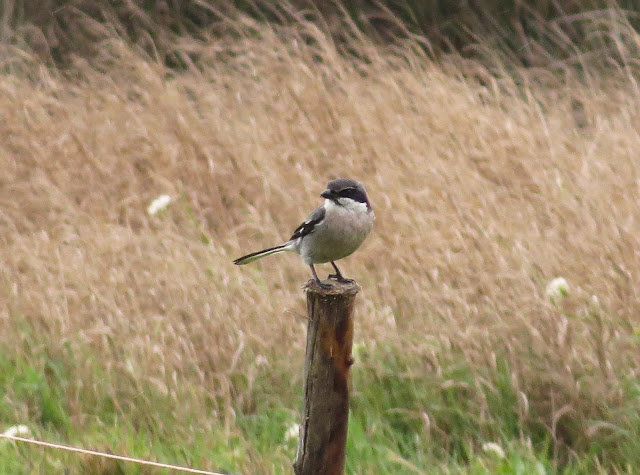 |
| Iberian Grey Shrikes |
Sadly, despite extensive searching, the Snowfinch was nowhere to be found, so we decided to cut our losses and head to a well-known site near Lagos in an attempt to catch up with Spanish Sparrows – a species I still needed despite two previous visits to Spain.
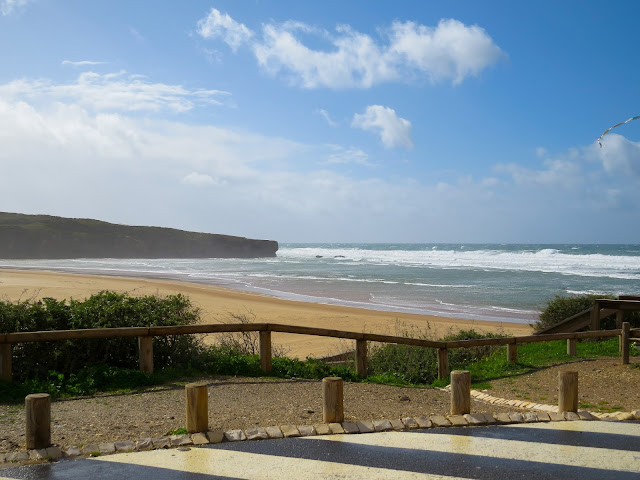 |
| A deceptive blue sky hiding the absolutely torrential weather Aljezur threw at us! |
With the rain thankfully easing as we drove further away from the fierce weather coming straight in off the Atlantic, we were able to take in more of the varied bird life whilst driving along. A large flock of Crag and House Martins flitted overhead as we left the mountains, while Black Redstarts were abundant throughout, flicking their tails and hopping up on to the roadside walls. Cattle Egrets were also incredibly numerous as we drove through the lush Portuguese farmlands, and we encountered several at close quarters as they hunted for frogs and invertebrates in the marshy grasslands.
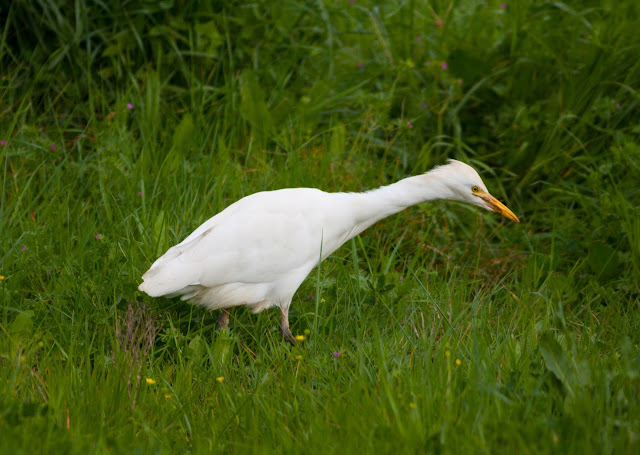 |
| Cattle Egret |
White Storks – always an iconic species for me when I visited Spain – were also relatively frequent, and we were afforded great views as a small group foraged in a crop field across the road from us.
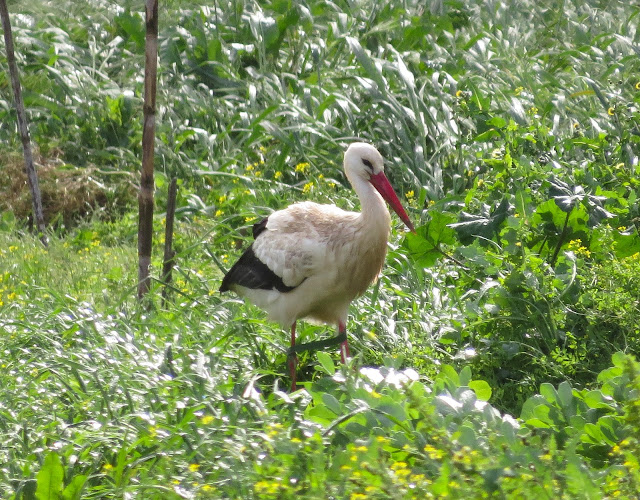 |
| White Storks were extremely common in Portugal despite still being in early February |
Arriving at the dusty tracks that lead to Ria de Alvor, the sun thankfully made an appearance as we crawled along the lanes scanning the small Portuguese dwellings for any Spanish Sparrows lurking in the adjoining yards. With up to 60 being reported from here recently the habitat looked ideal, and we were quietly confident we would be able to catch up with what, along with Lesser Kestrel, was starting to become a bit of a Mediterranean nemesis of mine.
The surrounding orange and lemon groves illuminated in the afternoon sun made a perfect backdrop to our drive, and after scanning through several House Sparrow flocks I finally hit Spanish gold – several fine male Spanish Sparrows resting on the sandy ground. With a distinctive red-brown cap and a diagnostic thin white ‘eyebrow’ line above the eye, they were easy to distinguish, and coupled with their extreme black markings on the chest and bright yellow bills they stood out from their male House Sparrow companions by a mile. After seeing what we presumed to be a group of hybrids at a petrol station en-route, it was a relief to finally nail the real deal.
 |
| Spanish Sparrow - note the thin white eyebrow and bold black chest markings |
Continuing on down the dirt tracks revealed a wealth of bird life – like a lot of the Portuguese landscape this particular area was extremely rich in farmland species. Corn Buntings and finch flocks were abundant in the leafy crops lining the road, while beautiful male Serins serenaded us from the tops of the trees, their magnificent yellow colouration glowing in the afternoon sun. A Hoopoe lead the way before us, constantly flitting in front of the car, while pairs of Red-legged Partridges scurried in to the safety of the grass.
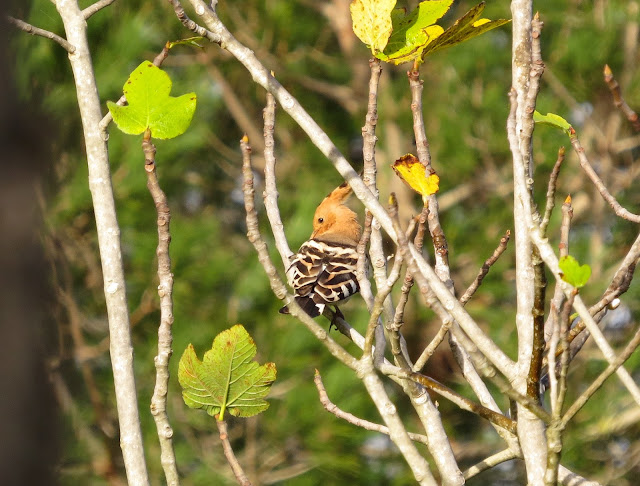 |
| Hoopoe |
More Iberian Grey Shrikes lined the wires, and we managed to catch up with several more large roving flocks of Iberian Magpies – fast moving and calling loudly, we soon learned it was extremely difficult to get any photos, and each individual never seemed to perch for any longer than a second before moving on.
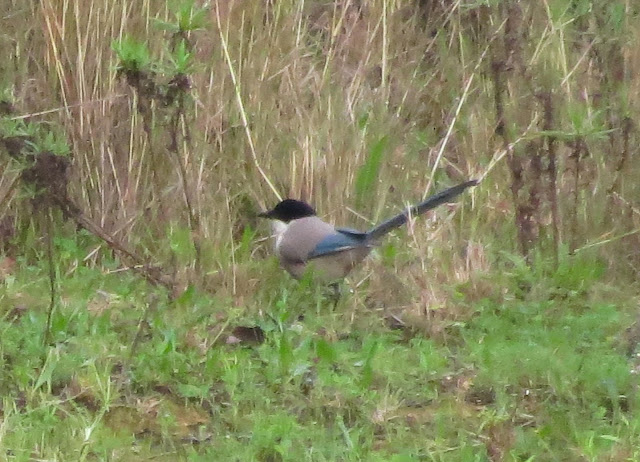 |
| A dodgy record shot of an Iberian Magpie - one of the few times they landed on the ground! |
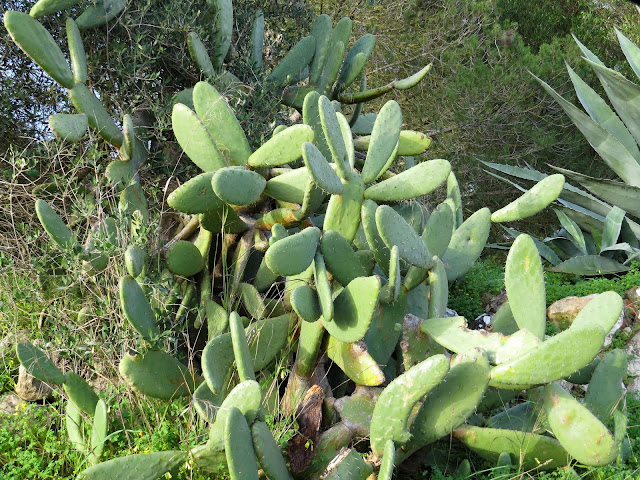 |
| Huge cacti plants lined the sides of the tracks! |
After getting our fill of the charismatic magpies and admitting defeat on the photo front, we headed over to the river to see what other species we could locate. Several Greater Flamingos eased their way through the choppy water using their magnificent bills to filter for miniscule food particles, while a lone Black-winged Stilt turned out to be our only one of the trip.
 |
| Greater Flamingos |
 |
| Black-winged Stilt |
Several Redshanks and Kentish Plovers hunkered down trying to avoid the now increasing gales, while more Crag Martins zipped across the water’s surface. With black clouds now steadily approaching, we followed a rather sticky clay trail along the side of the pool in an effort to locate any Bluethroats – apparently Ria de Alvor had been a good site for them in recent weeks with a number of adults reported.
A feeding Spoonbill was a nice find by Alex, while several more Corn Buntings lined the fence adjourning the field, their jangly-key song radiating out. Sadly, the rain that had been threatening from the onset finally delivered on its promise at this point, absolutely soaking us and resulting in a quick dash down the now waterlogged clay path, our Bluethroat mission now well and truly abandoned and my new boots now caked with sticky clay!
Although the rain disappeared as quickly as it had arrived, we were now positively wet through, and with the sun now starting to set, we decided to call it a day and head back to the hotel. Several more roving flocks of Iberian Magpies followed us through the orange groves to a fabulous backdrop of a rainbow as we drove, although following the trend, these too refused to stay still enough for any photos.
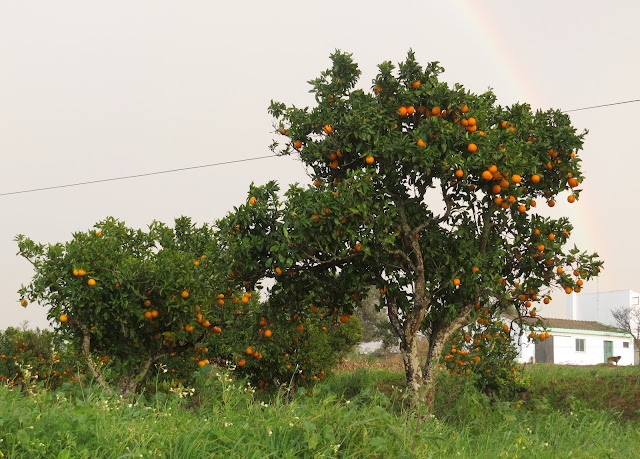 |
| The orange groves of Ria de Alvor |
With Iberian Magpies originally thought to be conspecific with the Azure-winged Magpies found throughout eastern Asia, recent genetic analysis has actually shown them to be distinct at species level, leading to their recent split and being afforded species status in their own right. Relatively common throughout our time in Portugal, we encountered large flocks nearly everywhere we travelled and the route back to our hotel in Lagos was no exception.
Driving along the N125 we noticed large numbers landing in the conifer trees at the side of the road, and turning around and parking up revealed a roost site with over 150 birds congregating together. The now fading light (coupled with their inability to keep still!) meant the photographic opportunities with this species were again limited, but it was incredible to sit and watch as more and more birds flew in from the surrounding area, piling in to the conifers and chattering excitedly.
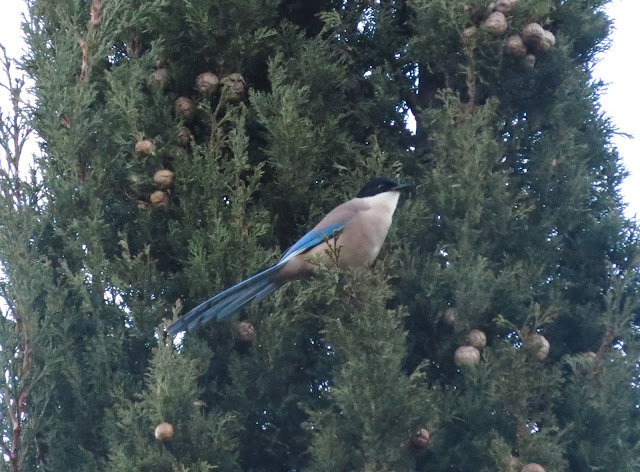 |
| Iberian Magpie |
At one point, the sky was filled with Iberian Magpies as they flew across the road, an amazing sight and a fitting finish to what had been a relatively productive first day in Portugal.
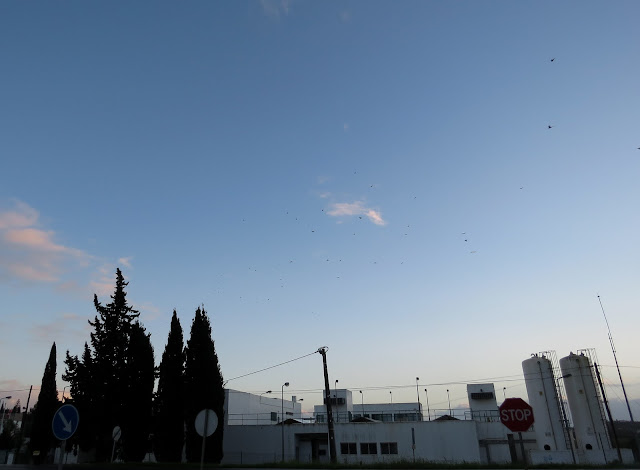 |
| Iberian Magpies headed to roost |
With the light now well and truly fading, we headed in to Lagos and were soon met with the difficult task of navigating the extremely narrows streets of the Old Town, followed by the even harder challenge of finding and manoeuvring in to a parking spot without scraping our brand new hire car! As ever, Alex handled it in expert fashion, and after checking in to our beautifully furnished Portuguese hotel (complete with our excessively muddy boots) we ended our first day in Portugal with a delicious Japanese meal a few doors down – perfect!


















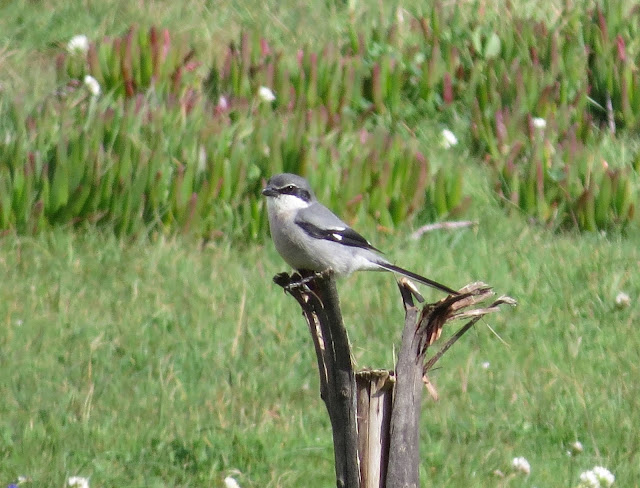
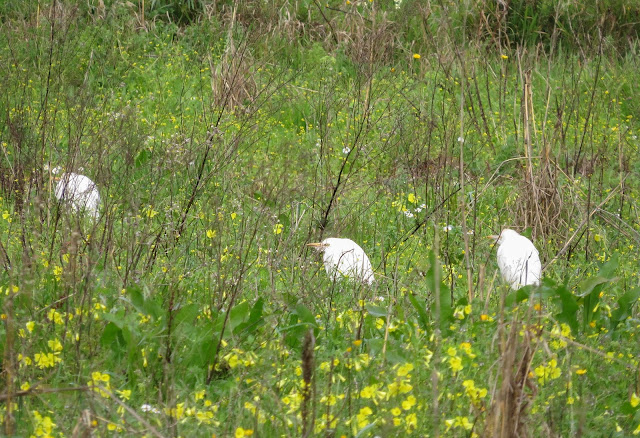
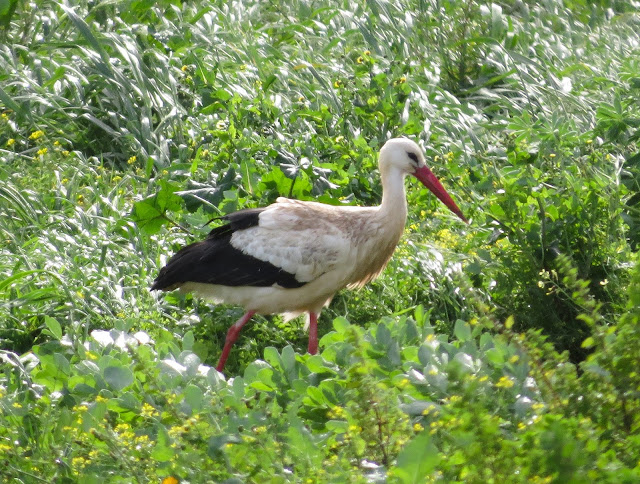


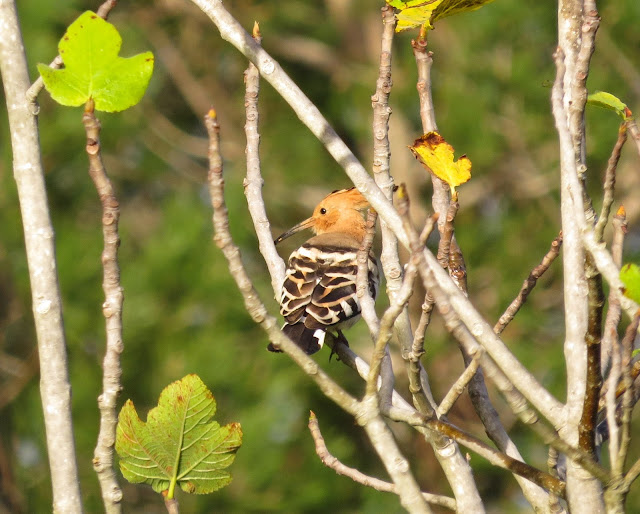

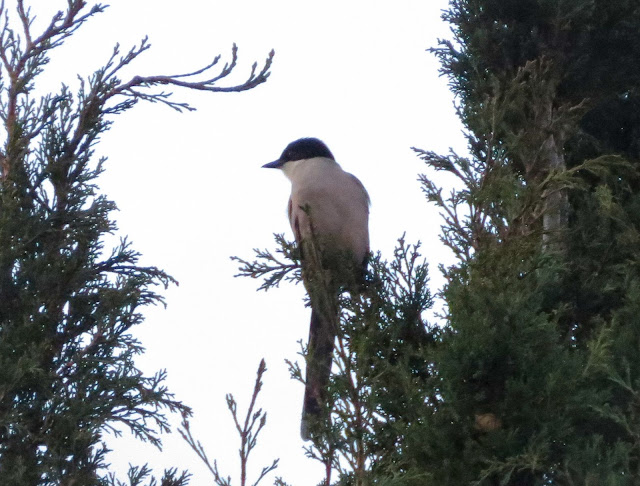
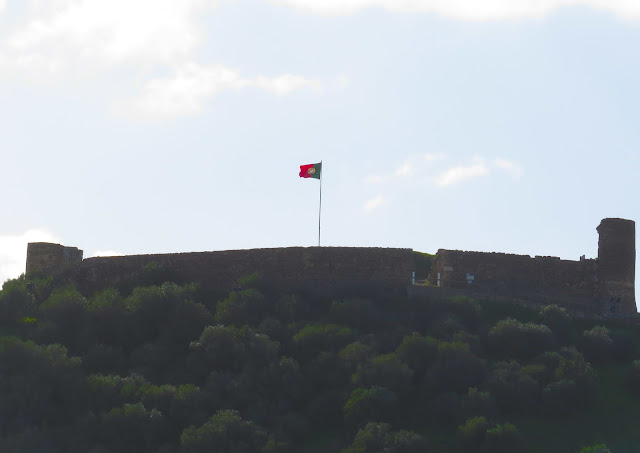
Excellent post.Thanks for sharing this message.Really,Your blog is not only instructive but useful too.
ReplyDelete_______________________
Dog Training Portland
Your article is really an inspiration to many. I'll be looking forward for more of your posts. Keep it up!
ReplyDelete___________________________
Dog trainers Memphis